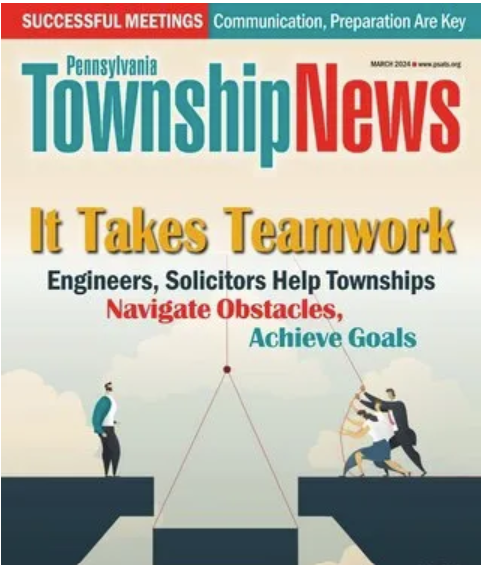PA will officially implement the International Code Council 2021 Code Series as the Commonwealth’s Uniform Construction Code. All municipalities and municipal code officials, in addition to designers, contractors and builders who work with them, must ensure compliance.
The Role of Township Solicitors
 Earlier this year, Pennsylvania Township News magazine requested an interview with Gawthrop Greenwood’s Municipal & Government Law Department regarding the role of solicitors in township government. Below is the content of that interview with Gawthrop Greenwood Government Law Department Leaders Patrick M. McKenna, Esq. and Stacey L. Fuller, Esq. Pennsylvania Township News is a publication of the Pennsylvania State Association of Township Supervisors (PSATS).
Earlier this year, Pennsylvania Township News magazine requested an interview with Gawthrop Greenwood’s Municipal & Government Law Department regarding the role of solicitors in township government. Below is the content of that interview with Gawthrop Greenwood Government Law Department Leaders Patrick M. McKenna, Esq. and Stacey L. Fuller, Esq. Pennsylvania Township News is a publication of the Pennsylvania State Association of Township Supervisors (PSATS).
CHRIS BRADY, ASST. EDITOR, PENNSYLVANIA TOWNSHIP NEWS: Talk a bit about the role of township solicitors today and how it’s changed over the years. Are there any limitations that solicitors face?
PATRICK M. McKENNA & STACEY L. FULLER: The Pennsylvania Second Class Township Code requires the solicitor to direct and control the legal matters of a Township. So, in some ways, our role has not changed that much as our responsibilities are outlined broadly by statute. Nevertheless, as we see on the national level, the public is more involved today at public meetings than they have been in the past, and more vocal about the issues facing their communities. The internet has made information — and misinformation — easily available to the public, and one of our biggest responsibilities has become facilitating understanding and education to our clients and often the public.
One of the limitations that we face is to provide appropriate legal guidance to our clients at public meetings while still maintaining attorney-client privilege. Often in the public meeting setting, we have to remind members of the public that our duty and representation is to the elected board of supervisors rather than to the public themselves.
PENNSYLVANIA TOWNSHIP NEWS: Should townships have solicitors on hand for township meetings? Why or why not?
McKENNA & FULLER: In most cases, yes, solicitors should be present for township meetings not only to help direct and maintain order, but to ensure due process is maintained and preserved so that all viewpoints are heard and considered by the board of supervisors before they take any official action. A solicitor may also be called upon to assist a board with making proper motions, speak to pending legal matters, and guide the board to avoid any missteps including violations of the Sunshine Act.
Do you have specific questions about government and municipal law? Contact our Government & Municipal Law Team to learn more.
McKENNA & FULLER: We believe it is to the client’s advantage to have a dedicated solicitor supported by the experience of an entire law firm. As peculiar or varied situations arise, we are able to address them effectively and efficiently. It also ensures that a competent attorney is always available to advise and support the township no matter the need.
PENNSYLVANIA TOWNSHIP NEWS: Talk about the need for specialized attorneys for townships and what may prompt a township to seek special counsel.
McKENNA & FULLER: Solicitors basically act as general counsel to municipal corporations, often focusing our daily attention on the Second Class Township Code, the Sunshine Act, the Right-to-Know Act and the Municipalities Planning Code, among other statutes. Specialized attorneys are important in a number of legal arenas, including labor matters, internal investigations and bond matters, as these areas of the law require particular knowledge and experience and, on occasion, independence from the main solicitor.





